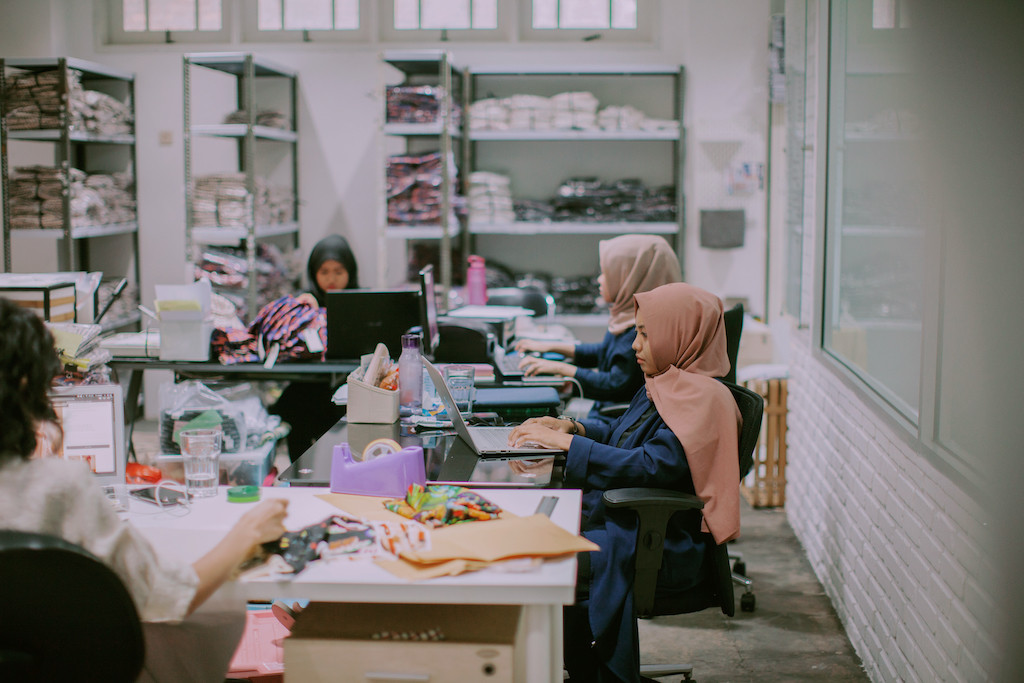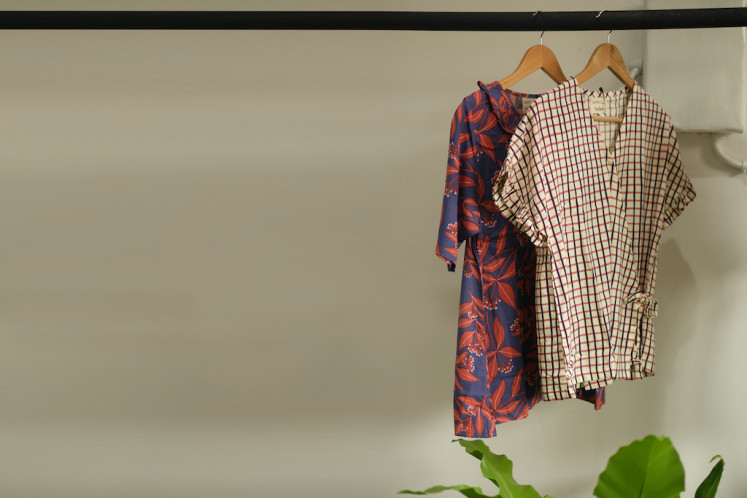Wear local, support Indonesian fashion
Indonesia’s fashion industry needed to have a supportive environment where it could maintain good quality and competitive prices.
Change Size

A
bout seven months into the pandemic, we have more or less adapted to the new way of life, including in dressing up. While we might still wonder when we will be able to wear our Sunday best again, we may also feel that we need to buy new clothes that are more comfortable to wear while working at home but still presentable for video conferencing. Or we might just want to wear a nice outfit as a mood booster.
When speaking of work-from-home fashion, the term loungewear inevitably comes to mind. This is the type of clothing that designer Ali Charisma described at a webinar titled “Fashion – The New Normal” as comfortable to wear at home but presentable for video conferences.
Margie Untoro, the editor in chief of Indonesian fashion magazine Dewi, said she liked to dress up to feel businesslike when working from home, but she acknowledged that loungewear was the choice of many people. She mentioned Suku Home, Sare Studio and CottonInk as the most popular local loungewear brands.
“Even Mel Ahyar is making loungewear now,” Margie told The Jakarta Post, suggesting that the style was so popular that even Mel Ahyar, who is known for bold statement pieces, is now creating laid-back loungewear.
Cempaka Asriani, founder of Indonesian fashion company Sare Studio, which uses the tagline #EverydayPajamas, confirmed that loungewear was in style, saying that her brand had recorded a 300 percent increase in sales during large-scale social restrictions (PSBB).
“The sales numbers are now stable at a high point. I hope it is a sign that people have become more aware of the importance of loungewear to improve quality of life at home,” says Cempaka.
With a prices between Rp 79,000 (US$ 5.45) for a scrunchie and Rp 479,000 for a nightdress, Cempaka acknowledged that Sare Studio’s pricing was higher than the same products from fast fashion brands, but that was because the company developed its own fabric and its print motifs were created in-house, she said.
“We created the fabric to be soft to the touch but highly durable,” she said, adding that the brand would not call itself sustainable and ethical because that came with greater responsibility, but the company had chosen rayon, which is considered more eco-friendly than other materials, including cotton.

The relatively high price of Sare Studio’s products, and its rocketing sales, contrary to cheaper global fast fashion brands who have had to close stores around the world, shows how consumers are becoming more conscious of what they buy.
Margie said many of her friends were buying things online.
“So I think people are still making purchases, but maybe they’re being more selective about what to buy,” she said.
Margie said the fast fashion giants who had closed stores worldwide had had a number of problems even before the pandemic hit because they had produced clothes at high volumes with low-quality materials and had sold them at lower prices, so their lifespan was short, and they quickly ended up in landfills.
“This pandemic only highlights existing problems,” said Margie, “So this pandemic is like a restart for the fashion industry, where there is an opportunity for local brands to fill the void left by fast fashion. This will be a great starting ground for many.”
However, Margie added that Indonesia’s fashion industry needed to have a supportive environment where it could maintain good quality and competitive prices.
Basrie Kamba, the director of Indonesian viscose rayon producer Asia Pacific Rayon (APR), said in the webinar that in order to achieve a supportive environment for the fashion industry, all players, namely producers such as APR, local brands, media, scholars, designers, workers and consumers had to unite.
“Textile and ready-to-wear industry players in Indonesia have no reason to experience a slump. There is no reason they can’t win in this competition, which has grown tighter and more sensitive. Don’t stop learning, exploring and collaborating with all your heart with local brands, designers, academics and others. Buy local products,” said Basrie.
Basrie’s encouragement was met with enthusiasm by Ali, Margie and another speaker at webinar, Norman Lukman, head of products at specialty apparel retailer and manufacturing company Delami Brands.
As a home-based company, Delami Brands had thrived during the pandemic, according to Norman. He said the silver lining of the pandemic was the acceleration of the digital transformation. A transition that was expected to take years happened in a matter of months.
“In January and February, the trends looked to Europe and East Asia. The main theme was festive. March to May was the most important period as Lebaran took place, but in March we had to halt production and in April we closed stores. Everyone is struggling with inventories. [We] shifted to online, were faced with high demand and became overwhelmed. It was a good time to learn. The company set-up changed, as we had to learn from start-up culture because we worked from home. We focused on social media content and mask donations,” said Norman.
He said all categories of clothing, including Lebaran outfits, shorts and t-shirts were in demand.
However, he said garment manufacturers had to be willing to take smaller orders to support small local brands.
“It will be less efficient, but they are obliged to support smaller business, […] so that we can grow together. And in order for the economy to get back on track, we must [help each other],” said Norman.
“I’m sure that Indonesian fashion can take off, but it needs the government’s support, with relaxations and a stage to showcase [the clothing],” Norman said.
Ali agreed that collaboration between industry players was important, and because the whole world was fighting COVID-19, the local fashion industry had the chance to dominate the market as it had become difficult for foreign products to enter the country.
“Collaboration is key to win in our own market. And we have to prove our love of local products by wearing them,” said Ali.
He said the market had to embrace luxury masks and jackets created by local designers, without judging the products for being out of touch with difficult times.
“Just like other luxury products, they will become part of a lifestyle, and they deserve a place in the fashion industry. Even now, luxury products from international brands are available and in demand because they serve a different function and market,” said Ali.









